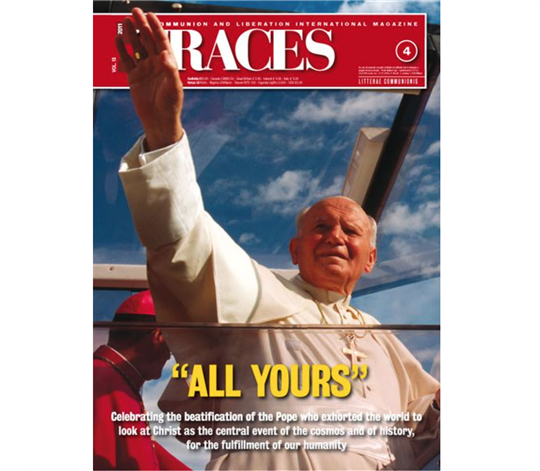
Traces N.4, April 2011
True HeritageIn the painful confusion presently surrounding us, only a few things are clear and certain. One of these is that we cannot live on the proceeds of the past any longer. For example, we cannot base our tranquility on political balances consolidated decades ago; they are collapsing in the most unforeseeable way, as we see in the ups and downs on the African continent. It is no longer possible to assume that wealth automatically produces wealth–as was the case in the past 50 years in Western countries–without re-investing it now, and at a risk. Even lifetime certainties like home or relationships can be swept away in a moment, or end up caged in by a threat of death that suffocates the future, as we see happening in Japan, stunned by the earthquake and by the nuclear menace. All this happened in a moment. This moment.
So, as you find yourself looking at those dramatic events, so shocking and so near, or seeing them reflected in the alarming reality near you (your home, your world), you realize that the challenge reaches you at a deeper, radical level. For your wealth, too, cannot be enough, even that wealth that once served to lay a foundation on solid ground–an encounter, a history behind you, an education–in a word: the Christian heritage, what many of us would define, quite rightly, as the crucial factor of life, that which has given form to our existence. We can't live on the proceeds even of that. A faith reduced to heritage, to an inherited treasure, doesn't automatically generate interest and dividends sufficient for living now, for surviving the onslaught of reality today. It's rather like the parable of the talents, if you remember, in which the owner is angry with his servant who buries his talent in the ground to keep it safe, instead of making it produce a profit. The talents are not only our gifts, our abilities, but also what has happened to us, the heritage granted to us by faith. If you don't risk it now, in time, it is of no use. If there is not a presence that enables you to augment it and make it fruitful now, it is useless. It can even be harmful.
The provocation of Easter, this Easter, reaches us here. "The Christian faith stands or falls with the truth of the testimony that Christ is risen from the dead," as Benedict XVI reminds us in the passage chosen for the CL Easter Poster (see Traces, vol. 13, No 3). If you take this away, we are dead, because faith is reduced to "a series of interesting ideas" or "a kind of religious world view," but it is "dead." All that's left is "our own judgment in selecting from His heritage what strikes us as helpful," and we find ourselves "left to ourselves," alone, unable to face up to the certainties that collapse, in a moment.
This is why Christ rose. He removes the stone from the grave, and He digs up the earth where we would like to hide what we have received, where at times we would have the temptation to bury the heritage of faith. He does it so as to give it back to us now, to make it bear fruit now, and to take away our loneliness from the world, for ever.
In this Poster, as you can see, there is another quotation, from Fr. Giussani: "What we know or what we have becomes experience" and so is useful for living, if it is "something that is given to us now. There is a hand that offers it to us now, there is a face that comes forward now, there is blood that flows now, there is a Resurrection that happens now. Nothing exists outside this 'now'!" But in this "now" is the Risen Christ, and so we can live. Happy Easter.